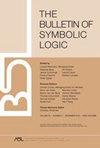真理与游戏:纪念加布里埃尔·桑杜的散文。托莫·阿霍和阿提·维克科·皮特里宁主编,《芬尼察哲学学报》,第78卷。芬兰哲学学会,赫尔辛基,2006年,第六卷,第322页。
IF 1.1
3区 数学
Q1 LOGIC
引用次数: 7
摘要
但它们总是发人深省。在审稿人的意见,在选择的主题在文本中最明显的遗漏是没有任何材料的可计算性理论和不完备性定理。当然,一个人在一个学期内所能完成的事情是有限的,而且总是有获取补充材料和文本的选择,但我希望作者能考虑通过对这两个重要主题的处理来丰富这篇文章的未来版本。我希望通过对波斯语逻辑教科书的简要讨论来结束这次评论,以便为这里所审查的工作提供一个背景。第一本现代逻辑教科书infarsis于半个多世纪前的1955年在伊朗出版。它的作者是g.h. Mosaheb,他是一位天才的、令人钦佩的不知疲倦的数学家、教育家和文学家。多亏了阿朗佐·丘奇的勤勉,这本书两年后被模糊逻辑的创始人l·a·扎德(l.a. Zadeh)在《符号逻辑杂志》上发表了评论;参见JSL, vol. 22, no。4(1957年12月),第354-355页。下一批进入伊朗的著名数理逻辑教材是恩德顿的《逻辑数学入门》的波斯语译本,以及汉密尔顿的《数学家逻辑》,它们在30年后的80年代中期问世,帮助向新一代学生介绍了这门学科。在20世纪90年代早期,Zia Movahed(一位哲学逻辑专家,他在伊朗也是一位著名的文学学者和诗人)撰写了一本关于现代逻辑的令人尊敬的入门教科书,最近(2002年)他出版了一本关于模态逻辑的重要教科书,这两本书都有望在不久的将来被BSL审查。阿里·埃纳亚特数学与统计系,4400 Mass。美国华盛顿特区美利坚大学西北大道20016-8050enayat@american.edu。本文章由计算机程序翻译,如有差异,请以英文原文为准。
Truth and games: Essays in honour of Gabriel Sandu. edited by Tuomo Aho and Ahti-Veikko Pietarinen, Acta Philosophica Fennica, vol. 78. Societas Philosophica Fennica, Helsinki, 2006, vi + 322 pp.
but they are always thought provoking. In the reviewer’s opinion, the most glaring omission in the choice of topics in the text is the absence of any material on computability theory and incompleteness theorems. Of course there is only so much one can accomplish during a mere semester, and there is always the option of reaching for supplementary materials and texts, but I hope that the author would consider enriching the future editions of this text with a treatment of these two important topics. I wish to conclude this review with a brief discussion of Farsi logic textbooks in order to provide a background for thework reviewedhere. The firstmodern logic textbook inFarsiwas published in Iran more than half a century ago in 1955. It was authored by G. H. Mosaheb, a gifted and admirably tireless mathematician, educator, and man of letters. Thanks to the industry of Alonzo Church, the book was reviewed two years later inThe Journal of Symbolic Logic by none other than L. A. Zadeh, the founder of fuzzy logic; see JSL, vol. 22, no. 4 (Dec. 1957), pp. 354–355. The next series of notable mathematical logic texts to arrive on the Iranian scene were the Farsi translations of Enderton’s A Mathematical Introduction to Logic, and Hamilton’s Logic for Mathematicians, which appeared three decades later in the mid-1980’s and helped to introduce the subject to a new generation of students. In the early 1990’s Zia Movahed (an expert in philosophical logic, who is also well-known in Iran as a literary scholar and poet) authored a respectable introductory textbook on modern logic, and more recently (2002) he published a substantial textbook on modal logic, both of which will hopefully be reviewed by BSL in the near future. Ali Enayat Department of Mathematics and Statistics, 4400 Mass. Ave. NW, American University, Washington, DC 20016-8050, USA. enayat@american.edu.
求助全文
通过发布文献求助,成功后即可免费获取论文全文。
去求助
来源期刊
CiteScore
0.60
自引率
0.00%
发文量
32
审稿时长
>12 weeks
期刊介绍:
The Bulletin of Symbolic Logic was established in 1995 by the Association for Symbolic Logic to provide a journal of high standards that would be both accessible and of interest to as wide an audience as possible. It is designed to cover all areas within the purview of the ASL: mathematical logic and its applications, philosophical and non-classical logic and its applications, history and philosophy of logic, and philosophy and methodology of mathematics.

 求助内容:
求助内容: 应助结果提醒方式:
应助结果提醒方式:


